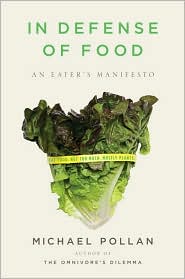My son-in-law cooks for relaxation while he finishes a PhD in ancient Mediterranean history. A researcher, he studies recipes I send him and shares the feeling that there is more to food than tasteless canned green beans.
During a visit, I watch Jason chop parsley. He cooks a tomato sauce with red cabbage and clams—not a combination I’d put together. But this is part of our relationship; we agree to try new tastes. “In the eye of the cook…food reveals itself for what it is: not a mere thing but a web of relationships among a great many living beings, some of them human…,” writes Michael Pollan.
While roasting tomatoes, I step outside the third floor apartment to snip a few branches of thyme from a plastic pot wired to the kitchen window. Dainty green leaves, tipped in silver, sprawl over the surface of the soil, exuding a sweet aroma.
Grow something, Michael Pollan writes. This way we remind ourselves of how pleasing our relationship with food can be. In In Defense of Food, Pollan retraces the history of U.S. food production since the 1940’s along with the negative changes in our health status. He demonstrates how research contradicts itself more often than not. No wonder we feel so confused about what foods maintain our health and enable us to enjoy life.
Pollan offers other advice: Shop the perimeters of the grocery stores to find fresh vegetables, fruits, and meats. Grandmother never would have considered most of the manufactured items in the center aisles as food. Share meals together. Cook, if you can. “To reclaim this much control over one’s food, to take it back from industry and science, is no small thing; indeed, in our own time cooking from scratch and growing any of your own food qualify as subversive acts,” Pollan writes.
For Christmas dinner, my son-in-law slowly cooks winter meatballs with savoy cabbage, sautéed with garlic and plum tomatoes, reducing them to their essence. The layers of seasonings mimic the feeling of our visit, rich and complex. We express our love in the collective sigh of satisfaction that follow our first taste.
It is easy to feel overwhelmed by our fast food way of life. But it is also easy to take the first step towards creating something good to eat. That first step can be with a sprig of thyme.
—
J. Luise is founding partner of Wiv Inc, a company introducing businesses to innovative ways of thinking. She earned an MFA in Goucher College’s creative nonfiction program and served a postgraduate fellowship at Massachusetts College of Art and Design.

